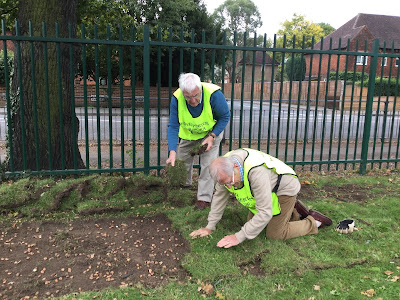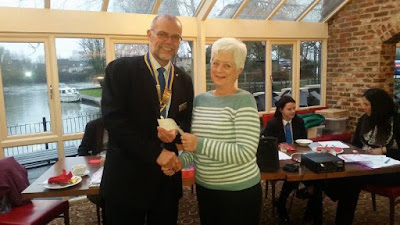21 September. Today we planted 5,000 purple crocuses. So why on earth did
we do that? Well, it’s all part of Rotary’s ongoing campaign to rid the world
of Polio. I can remember going to school with children who were affected by
Polio, which paralysed their limbs and made walking without assistance almost
impossible. That’s because 50 years ago, Polio was very evident in the UK, as
it was throughout the world. Most people I knew whilst growing up would have
known someone, or a family that was affected by the disease. Since 1988, when
Polio was still endemic in 125 countries, Rotary have been working to eradicate
this terrible disease, launching the ‘End Polio Now’ campaign with tremendous
success. New cases of polio have reduced by 99.9% and it is now endemic in just
3 countries, Pakistan, Afghanistan and Nigeria.
This has been
achieved through tremendous efforts to immunise all children in countries where
it is endemic. This has to be done yearly, even after there have been no new
cases reported in that country. Hundreds of millions of children are immunised
every year with an oral vaccine, and two of my colleagues at Shepperton Aurora
have attended national Immunisation days (NIDs) in India. In the sub-continent
there have been no new reported instances of the virus for 2 or 3 years, but annual immunisation of
millions of kids must continue whilst there is a risk of it returning. The cost
of this programme is huge, running into many millions of pounds, but we have a
major partner in Microsoft founder Bill Gates, who through his charitable
Foundation, gives £2 for every £1 we raise. Therefore £100 raised by Rotary
towards End Polio Now becomes £300.
Bill Gates
So many children are immunised every year in India alone
that a way needed to be found to establish who had been inoculated and who
hadn’t, or there would be a risk of treating the same child more than once. The
problem was solved by painting the little finger on the left hand of each child
who had been immunised purple. The dye used takes a few days to come off. So the idea of the ‘purple pinkie’ was born.
Children will still try and have a second dose, by covering their fingers with
a bandage or suchlike, because recipients always get a sweet, or a toy or
something to encourage them.
A child's finger is painted
In the last couple of years Rotary in Britain and Ireland
has had a ‘Purple for Polio’ campaign to assist our fundraising for the
immunisation programme. The purple crocus has come to symbolise the Purple for
Polio campaign, as it represents the ‘purple pinkie’. RIBI’s plan is to plant
10 million purple crocuses throughout our islands this year, and we have bought
5,000 of them. Sunbury Manor School
agreed that they could be planted at the school, and have gone even
further by purchasing another 5,000 themselves. Allan Cottle, Deputy Head at
the school has been very supportive of our wishes to publicise the End Polio
Now campaign, and offered us a stretch of grass between the school car park and
the street, where we can create a swathe of purple next spring through the mass
planting of crocuses.
Crocuses
Having been ordered in July, the crocuses (variety Ruby
Giant) arrived from Holland in mid-September, and it was my task to collect our
club’s order of two boxes from Company Moves in Fleet, the business of Kevin
Mack, who generously took delivery of all the boxes ordered for our District.
The e-mail said that 1.5 tons of boxes had been delivered, and hinted that a
fork-lift truck may be needed to get them in and out of cars. This took me by
surprise, as I didn’t think there would be a great deal of weight to our two
boxes. Before leaving for Fleet, I took the precaution of emptying the car boot
and folding down the rear seats, so there would be plenty of room, and I just
hoped the car’s suspension would be up
to the job. It all turned out to be a false alarm. The boxes really weren’t
very big, and probably weighed about 4 to 5 stones each. Kevin and I got them
into the boot without any trouble, and off I went.
What a carpet of 'Ruby Giant' should look like
Now we were in possession of the crocuses, I wanted to waste
no time in getting them into the ground. 5 days later, a working party
comprising myself, the PDG, Ken, Chris, Peter, Lyn, Joe and Doreen came along
to the school to undertake this project. The instructions said we needed to
remove a square yard of turf to a depth of three inches, sprinkle 150 crocus
corms evenly into the hole created, then replace the turf. Not too difficult,
you may think, but we had to repeat this about 70 times. In seeking volunteers,
I pointed out that we didn’t just want diggers, but counters too, as it would be
an important job just to count the corms into batches of 150.
Counting corms - the PDG and Ken
We had a 30 yard stretch of grass to plant up, so we quickly
got down to work, creating a rolling trench. The diggers (Chris and I, and Joe
for a while)slowly worked across the grass digging out the turf, the ground
underneath was raked and planted with crocuses, then filled in again. It was
quite hard work at times, but we had a lot of laughs, and the time passed very
quickly. The school provided us with coffee, and both Head Teacher Louise Duncan
and Deputy Head Allan Cottle came out to thank us for the work we were doing.
The Head’s PA, Joanne Barrett even helped with the planting. Fortunately the
weather was dry and mild in the morning whilst we were working, and there was
rain later on. Perfect growing conditions, I think.
Joanne helps with planting
The site we were working on was partly under the shade of an
oak tree, and the grass had quite a sprinkling of acorns, many of which were
buried under the turf with the crocuses. Who knows, in Spring we may not only
have a superb blanket of crocuses covering the ground, but an oak tree nursery
as well.
Peter pieces together the turf jigsaw
I liked the fact we were wearing our Rotary tabards and thus
highly visible to passers by, although there was the occasional
misunderstanding, as when two youths passed by, and I heard one say to the
other ‘ I see the Rotary Club are doing Community Service.’ Actually, that is
just what we were doing, although not in quite the same way that he was
suggesting.
Chris and I do the digging
Our original intention was to plant all 10,000 of them, but
the space given to us was only big enough for 5,000. So we gave the other 5,000
to Allan Cottle (he had paid for them after all) and he was planning to get the
Interact Club involved in planting them around the school, including the Rotary
garden that we created last year.
Everybody looks busy
All we need to do now is create a suitable sign to erect on
the grass, so that people will understand the symbolism of the bed of crocuses.
We also need to cross our fingers that the crocuses actually appear in Spring.































































